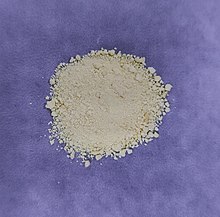Chemistry:Cerium(IV) hydroxide
From HandWiki

| |
| Names | |
|---|---|
| IUPAC name
cerium(4+);tetrahydroxide
| |
| Other names
ceric hydroxide
| |
| Identifiers | |
3D model (JSmol)
|
|
| ChemSpider | |
| EC Number |
|
PubChem CID
|
|
| UNII | |
| |
| |
| Properties | |
| Ce(OH)4 | |
| Appearance | bright yellow solid |
| Related compounds | |
Other cations
|
lanthanum hydroxide praseodymium hydroxide |
Related compounds
|
cerium(III) hydroxide cerium dioxide |
Except where otherwise noted, data are given for materials in their standard state (at 25 °C [77 °F], 100 kPa). | |
| Infobox references | |
Cerium(IV) hydroxide, also known as ceric hydroxide, is an inorganic compound with the chemical formula Ce(OH)4. It is a yellowish powder that is insoluble in water but soluble in concentrated acids.[1]
Production
Cerium(IV) hydroxide can be produced by reacting cerium(III) carbonate and acetic acid, then oxidizing it with hydrogen peroxide in base. The reactions are:[2]
- Ce2(CO3)3 + 6 CH3COOH → 2 Ce(CH3COO)3 + 3 CO2↑ + 3 H2O
- 2 Ce(CH3COO)3 + 3 H2O2 + 4 H2O → 2 Ce(OH)3(OOH) + 6 CH3COOH
- CH3COOH + NaOH → CH3COONa + H2O
- 2 Ce(OH)3(OOH) → 2 Ce(OH)4↓ + O2↑
The net equation is:
- Ce2(CO3)3 + 6 CH3COOH + 3 H2O2 + 6 NaOH —343 K→ 2 Ce(OH)4 + 6 CH3COONa + O2↑ + 3 CO2↑ + 5 H2O
If using cerium(III) nitrate as ingredient, a similar reaction occurs:[3]
- 2 Ce(NO3)3 + 3 H2O2 + 6 NH3·H2O → 2 Ce(OH)3(OOH)↓ + 6 NH4NO3 + 2 H2O
- Ce(OH)3(OOH) —Δ→ 2 Ce(OH)4↓ + O2↑
It might also prepared by addition of sodium hydroxide or ammonium hydroxide to a Ce4+ solution, being obtained as a gelatinous precipitate described as CeO2·xH2O, (x = 0.5–2). Boiling an insoluble Ce4+ salt in NaOH gives granular Ce(OH)4.[1]
References
 |

